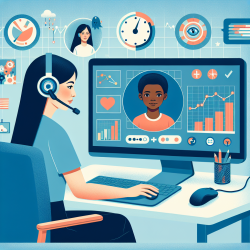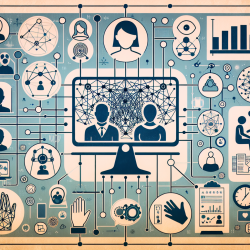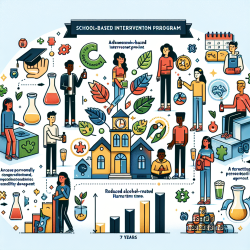Introduction
In the ever-evolving field of child therapy, practitioners are constantly seeking innovative methods to improve outcomes for their young clients. One such innovation is the use of electronic consultations (eConsults), which has shown promising results in psychiatry for primary care providers. A study titled Evaluation of an electronic consultation service in psychiatry for primary care providers explores the effectiveness of eConsults and their potential to transform child therapy practices.
The Power of eConsults
The study conducted a retrospective review of eConsults between primary care providers and psychiatrists, revealing significant benefits. With an average response time of 2.3 days and 87% of consultations completed in under 15 minutes, eConsults provide timely and efficient access to specialist advice. This is particularly crucial in child therapy, where early intervention can significantly alter developmental trajectories.
Key Findings and Their Implications
- Common Clinical Topics: The most frequent inquiries were about depressive and anxiety disorders, which are prevalent in child therapy. This highlights the need for practitioners to be well-versed in these areas and to leverage eConsults for specialized guidance.
- Impact on Referrals: The study found that eConsults can reduce the need for face-to-face referrals, with 30.7% of cases avoiding traditional consultations. This can lead to more efficient use of resources and reduced wait times for children needing urgent care.
- Perceived Value: An overwhelming 88.7% of primary care providers rated the eConsult service as excellent or very good. This high satisfaction rate underscores the potential of eConsults to enhance child therapy practices by providing quick access to expert opinions.
Implementing eConsults in Child Therapy
For practitioners in child therapy, integrating eConsults into their practice can be a game-changer. Here are some steps to consider:
- Training and Competency: Ensure that your team is trained in using eConsult platforms and understands the protocols for submitting detailed patient histories.
- Building Relationships: Develop a network of specialists who can provide timely and relevant advice. This can foster a collaborative environment that benefits both practitioners and their young clients.
- Continuous Evaluation: Regularly assess the impact of eConsults on therapy outcomes and adjust strategies accordingly. This data-driven approach ensures that interventions remain effective and aligned with best practices.
Encouraging Further Research
While the study provides valuable insights, it also opens the door for further research. Practitioners are encouraged to explore the following areas:
- Comparative studies on the effectiveness of eConsults across different regions and demographics.
- Longitudinal studies to assess the long-term impact of eConsults on child therapy outcomes.
- Investigations into the integration of eConsults with other digital health tools to enhance therapeutic interventions.
Conclusion
The use of eConsults in psychiatry offers a promising avenue for improving child therapy outcomes. By adopting this innovative approach, practitioners can access timely expert advice, reduce unnecessary referrals, and ultimately provide better care for their young clients. As we continue to navigate the complexities of child therapy, data-driven decisions and collaborative practices will be key to unlocking the full potential of our interventions.
To read the original research paper, please follow this link: Evaluation of an electronic consultation service in psychiatry for primary care providers.










